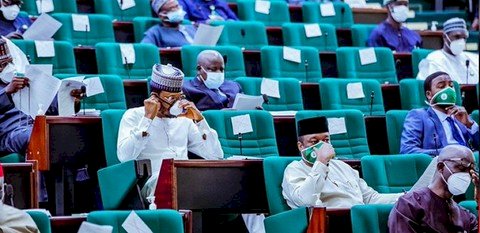House of Reps Reject 'Castration' As Punishment For Rapists
A member, Mr James Faleke, had recommended that persons found guilty of rape should be castrated.

The House of Representatives has voted against a prayer seeking to recommend castration for rapists.
The House, at the plenary on Thursday, considered and adopted a motion on the rising cases of sexual violence in Nigeria.
A member, Mr. James Faleke, had recommended that persons found guilty of rape should be castrated.
Just before the prayer was subjected to a voice vote, the Speaker, Femi Gbajabiamila, however, asked what would happen to an older female who rapes a younger male.
The comment generated noise in the chamber.
A shocked Minority Leader, Rep. Ndudi Elumelu, in a swift response to the voice vote, sought a repeat of the process, through a Motion on Recision.
He argued that if taken, it would mean the House was against the punishment of rapists. His argument was adopted and the prayer was subjected to a second voice vote, but the nays still had it.
Faleke’s prayer came on the heels of a Motion sponsored by Rep. Rotimi Agunsoye on sexual violence in the country.
READ ALSO:
COVID-19: Bauchi Deputy Governor, Baba Tela Tests Positive

Agunsoye’s Motion is entitled:
“THE NEED TO CONDEMN THE RISING CASES OF SEXUAL VIOLENCE AND OTHER SOCIAL VICES AGAINST WOMEN AND POLICE BRUTALITY: JUSTICE FOR UWA OMOZUWA, TINA EZEKWE, AND OTHERS”.
While presenting his Motion, Mr. Agunsoye, expressed his worries, ” about the disturbing growing spate of violence against ‘ women and girls recorded throughout the country”, stressing that, “most common violence against women and girls are: Rape, Sexual harassment, emotional and psychological violence and socio-economic violence”.
He said he was “disturbed that women and the girl child are daily exposed to this gender-based violence in Nigeria with negligible statistics of convictions compared to the prevalence of the dastardly acts and that weak institutions, poor enforcement, poverty, and unacceptable social practices contribute to the ugly increase in violence against Nigerian women and girls”.
He noted that “findings show that an alarming 28% of Nigerian women aged between 25 29 years have experienced some form of physical violence against them, many of which remain unreported, were not prosecuted or could not secure conviction”.
The lawmaker told his colleagues that he was “disturbed, about the rising cases of Police brutality across”
He recalled that “a few days ago the media was awash with reports of gory cases of fatal violence against girls in Nigeria”, calling on the House to adopt capital punishment for rapists and dress in black at the next sitting in honour of the victims of sexual violence in the country.
The House adopted his Motion, with additional prayers to codify amendments such as punishing rapists, be they female or male, to set up and equip forensic units in police stations across the country, for the purpose of detecting rape case, to urge the National Orientation Agency to sensitize Nigerians on issues of rape.
The House also resolved to urge State governors, to domesticate the Child Rights Act and Violence Against Women Acta, to prevent further sexual violence against persons and minors.





































